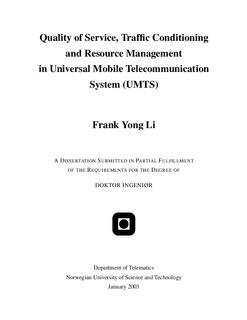Quality of Service, Traffic Conditioning and Resource Management in Universal Mobile Telecommunication System (UMTS)
Abstract
The successful deployment of Universal Mobile Telecommunication System (UMTS) is heavily dependent on Quality of Service (QoS) to be achieved. This thesis addresses a few facets of the QoS issues in UMTS, including traffic shaping and policing, conformance consistency, Call Admission Control (CAC) and resource allocation.
The main focus of this thesis is traffic conditioning related issues for QoS provisioning in UMTS. Assuming an end-to-end QoS scenario supported by IntServ or/and Diffserv architectures, the thesis initially presents an all nodes traffic conditioning-enabled framework in UMTS. Under this framework, the traffic generated at each User Equipment (UE) is regulated by a traffic shaper in the form of a token bucket, and the conformance of the traffic flow is policed at the policing node. The performance of imposing traffic shaping at the UE is studied and compared with the case without shaping. Next, having observed that the performance of the traffic conditioned system is sensitive to the values of the token bucket parameters, the thesis proposes a heuristic approach for searching local and global QoS-aware token bucket parameters. By tuning the system operating at the obtained ’optimal’ shaping parameters, the requirements for all concerned QoS attributes are guaranteed. Furthermore, the thesis studies conformance consistency in a traffic conditioned multi-hop network, by monitoring the conformance status of a traffic flow using an identical token bucket for both traffic shaping and policing. In the presence of variable packet size, the thesis gives a quantitative result, for a simple case, on how much percent of the originally conformant packets may misbehave at further policing node(s). The performance of the aggregated traffic flows and the measures to minimize the effect of conformance deterioration are also studied in the thesis.
Another facet of the QoS issues in UMTS, CAC together with resource allocation, is also studied in the thesis. A priority-oriented framework for QoS management of multimedia services in UMTS is proposed. Based on a traffic class priority definition, the framework is implemented through a priority-oriented CAC, channel congestion control and adaptive bandwidth allocation.
